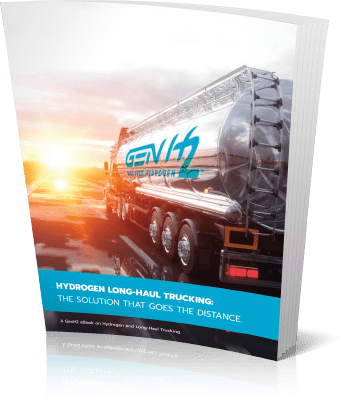The Ultimate Power Source
The Powerful Capabilities of Hydrogen
There is a myriad of reasons why switching from fossil fuels to hydrogen would be advantageous for the long-haul industry. For starters, each truck running on diesel emits 822 g/km of carbon and consumes on average 192 liters of fuel in a single day. The biggest issue, however, comes in the form of idle burn-off. Globally, trucks consume 2 billion liters of fuel while running, and an additional 838 million gallons sitting idle in traffic. To top it all off, trucks consume 60,685 billion BTUs of energy every year. These numbers aren’t just staggering—they’re growing. As long-haul trucking becomes an increasingly popular way to transport goods, it’s also a leading cause of GHG in our cities and roadways.
Hydrogen fuel cells provide a solution to every setback accrued with the long-haul trucking industry. They are not only lighter than other fuel cells, but they produce enough onboard energy to remove the need for a battery, and they emit zero-emission water vapor as opposed to carbon. In addition, hydrogen carries far more energy than diesel and petrol, with trials showing it to be 3x more efficient.
The largest benefit, however, comes with the fact that hydrogen would be far more inexpensive than current fuel sources. With the ability to be made on-site, hydrogen won’t have to be imported or priced based on availability. Renewability means that it will remain consistently monetized and accessible for all trucks.

Download our eBook to learn more about how GenH2 is revolutionizing the trucking industry.
- 3x more efficient
- Zero emission
- Made on-site
- Scalable fuel cells
- Renewable
- Safe to use

